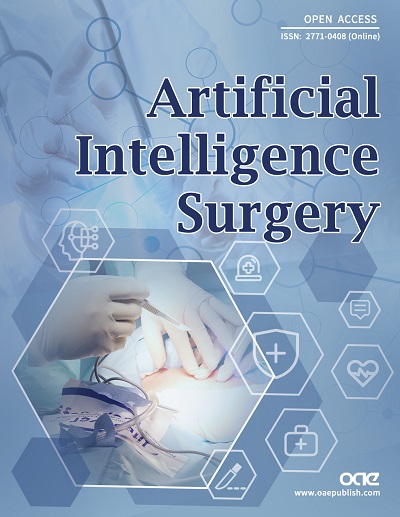
Topic: The Role of Artificial Intelligence in Neurosurgery
A Special Issue of Artificial Intelligence Surgery
ISSN 2771-0408 (Online)
Submission deadline: 1 Jul 2025
Guest Editor(s)
Special Issue Introduction
Neurosurgery, one of the most challenging, complex and delicate fields in medicine, has always been at the forefront of adopting new technologies to improve patient outcomes. With the advent of artificial intelligence (AI), a new horizon of possibilities has emerged. AI's ability to analyze vast amounts of data, recognize patterns, and provide predictive insights makes it an invaluable tool in neurosurgery. From preoperative planning to intraoperative navigation and postoperative care, AI stands to revolutionize how neurosurgeons approach and perform their intricate work and has made significant strides in the field of neurosurgery.
In the following neurosurgical subdisciplines, but not exclusively, AI could play a major role:
● Epilepsy Surgery;
● Functional Neurosurgery;
● Neurovascular Surgery;
● Tumour Surgery;
● Spine Surgery.
AI systems, such as machine learning and deep learning models, have been trained on extensive datasets of medical images and surgical outcomes, enabling them to assist in precision medicine. Robotic-assisted neurosurgery, powered by AI, has also emerged, offering enhanced dexterity and accuracy during procedures, especially in stereotactic and functional neurosurgery. These developments have led to reduced surgical times, minimized risks of complications, and improved overall patient care.
Using different platforms, like
● Artificial Neural Networks (ANN);
● Convolutional Neural Networks (CNN);
● Deep Learning Models (DLM);
● Machine Learning (ML);
● Recurrent Neural Networks (RNN);
● Simulated Neuronal Networks (SNN).
AI could substantially contribute to improving our specialty.
A critical, conventional, but on the other hand, constructive standpoint must always be maintained, compared to the continuation of teaching neuroanatomy for neurosurgery after the implementation of neuronavigational techniques into neurosurgery almost 40 years ago.
I am excited to explore aspects in which AI can contribute to further development in neurosurgery while human input and intelligence have to always be at the forefront of its development.
This Special Issue aims to contribute to the ongoing evolution of neurosurgical practices, ensuring that AI's transformative potential is fully realized for the benefit of patients and healthcare providers alike. We invite contributions from researchers, clinicians, and innovators to join this exploration of AI's future in neurosurgery.
In the following neurosurgical subdisciplines, but not exclusively, AI could play a major role:
● Epilepsy Surgery;
● Functional Neurosurgery;
● Neurovascular Surgery;
● Tumour Surgery;
● Spine Surgery.
AI systems, such as machine learning and deep learning models, have been trained on extensive datasets of medical images and surgical outcomes, enabling them to assist in precision medicine. Robotic-assisted neurosurgery, powered by AI, has also emerged, offering enhanced dexterity and accuracy during procedures, especially in stereotactic and functional neurosurgery. These developments have led to reduced surgical times, minimized risks of complications, and improved overall patient care.
Using different platforms, like
● Artificial Neural Networks (ANN);
● Convolutional Neural Networks (CNN);
● Deep Learning Models (DLM);
● Machine Learning (ML);
● Recurrent Neural Networks (RNN);
● Simulated Neuronal Networks (SNN).
AI could substantially contribute to improving our specialty.
A critical, conventional, but on the other hand, constructive standpoint must always be maintained, compared to the continuation of teaching neuroanatomy for neurosurgery after the implementation of neuronavigational techniques into neurosurgery almost 40 years ago.
I am excited to explore aspects in which AI can contribute to further development in neurosurgery while human input and intelligence have to always be at the forefront of its development.
This Special Issue aims to contribute to the ongoing evolution of neurosurgical practices, ensuring that AI's transformative potential is fully realized for the benefit of patients and healthcare providers alike. We invite contributions from researchers, clinicians, and innovators to join this exploration of AI's future in neurosurgery.
Submission Deadline
1 Jul 2025
Submission Information
For Author Instructions, please refer to https://www.oaepublish.com/ais/author_instructions
For Online Submission, please login at https://oaemesas.com/login?JournalId=ais&SpecialIssueId=ais240729
Submission Deadline: 1 Jul 2025
Contacts: Zoey Han, Assistant Editor, AIS_editor@oaepublish.com







